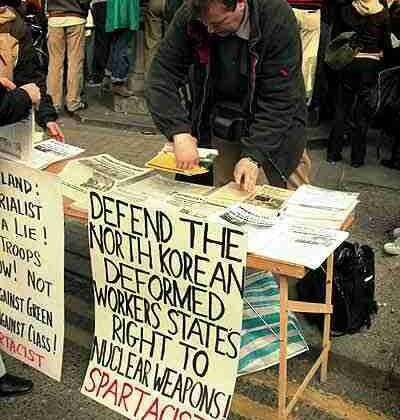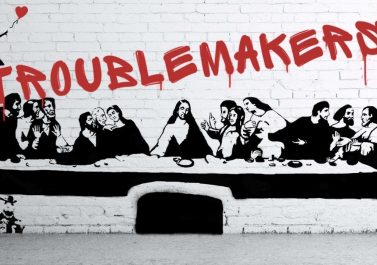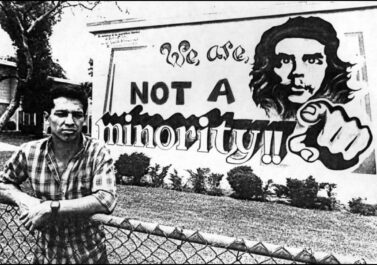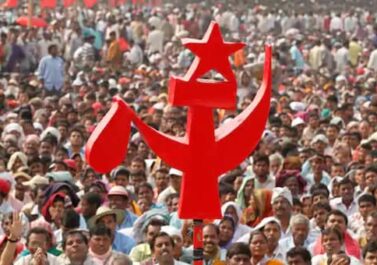The Lets Get Rooted initiative have been discussing an article by Sai Englert published on the Notes from Below blog. We are in process in writing down our thoughts on the text.
https://notesfrombelow.org/article/notes-organisation
During the discussion the question came up whether we see ourselves as part of the left. A comrade wrote down some thoughts that we want to share below.
———
Throughout this article the author talks about the ‘socialist left’. In our own discussion people raised the question ‘are we part of this ‘left’, how do we relate to it?’
In a period when there is little class activity it can seem as if the ‘left’ is a bit like contestants at a beauty pageant. All line up and let people take their pick – you want the parliamentary road to socialism or something with a bit more of the barricades?
But once parts of the working class begin to act this beauty pageant vision vanishes and even in our own meeting last night you had a tiny glimmer of this in the report from the comrade involved in the Tower Hamlets strike.
The council workers vote for strike action to defend their conditions which the Labour Council is trying to destroy. The union leadership tries to ignore the vote and is looking for an ‘exit strategy’ ie a way to accept defeat while pretending it isn’t. The local union branch leadership stays quiet on this. Unravel these actions.
Everyone involved is a ‘socialist’ – would swear on their dying grandmother’s grave that they are trying to improve the lot of the workers. But the Labourites of the local Council long ago gave up resisting central government diktats and for them loyalty to the state comes first. The union leaders have always left ‘politics’ to the Labour Party and are so tied to it that in a clash between their members interests and the Labour council’s they will ultimately side with the council. The local union branch leadership are members of a ‘revolutionary’ group but their perspectives are to try to take control of the unions by winning positions and they are part of this ‘game’ of controlling the working class so again in a clash between the members and the union leadership they ultimately cover for the later. A kind of chain of deception, all brought to light by the workers in action.
So you now have this ‘left socialist’ spectrum on one side and the workers trying to defend their conditions on the other.
This little illustration can be put in a bigger historical framework.
All of this ‘spectrum’ has common origins in the Second International (leave aside the First for this little journey) inspired by the Communist Manifesto of Marx and Engels.
Up to the 1st World War all the European socialist parties were part of this ‘marxist’ international and would all wave the banner of ‘Workers of the world unite!’ However the growth of these Social Democratic parties and their associated trade unions with millions of members also led to the growth of a growing labour bureaucracy, people who had The Communist Manifesto in their pocket but who grew to like their new offices, their incomes and their ‘place ‘ in society.
The outbreak of the 1st World war saw nearly all of the leaders of these parties vote to support their own governments and helped send millions of their working class supporters to be massacred. After the war they came back together and once more waved their banner of workers’ unity. All of the present day Social Democratic parties, like Labour in the UK, have politics that flow directly from this period – loyalty to their own states. Think Neil Kinnock refusing to support the miners in 1984. Think Blair and the Iraq war. Think Jeremy Corbyn, angered last week because his nominations for the House of Lords were not accepted by Boris Johnson.
But while the majority of the 2nd international supported the war a handful of people gathered in Zimmerwald, Switzerland, to say ‘down with the war, long live workers internationalism’. At this point was there a spectrum of the left that covered both the war mongers and the anti-war internationalists, after all they all called themsleves socialists, or was there an unbridgeable divide?
Lenin and Rosa Luxembourg were there at Zimmerwald and without this opposition to the war the events in Russia in 1917 would not have developed the way they did. But the future of the workers’ uprising in Russia, a country where the mass of the population were peasants who had no interest in a socialised economy, depended on a workers’ uprising in the rest of industrialised Europe.
A revolt in Germany was crushed by the Social Democrats, Luxembourg and other working class militants were murdered. As part of the same wave of workers’ struggle in the UK the 1926 general strike broke out. Growing in strength day by day the Prime minister and the King called in the leaders of the Labour Party and the TUC and said ‘Gentlemen, you are now stronger than the governement, are you ready to take power? The worthy gentlemen of the ‘left’ – socialists all – were so horrified at the thought they called the general strike off.
Within this general strike their was a subtext. The isolation of the Russian Revolution and deep flaws in the outlook of the Bolshevik party was already leading to the newly formed communist parties (grouped in the 3rd International) around the world beginning to go down the same road as the Second International by a roundabout route. The Labour Parties owed their loyalty to their own states, the new communist parties owed theirs to Russia – but Russia was moving towards a life of co-existence with capitalism. The British Communist party would soon adopt ‘The British road to socialism’ as their platform – a programme of parliamentarianism. In the 1926 general strike the new communist party faced its first great test. Would it try to develop the independent role of the working class or side with the labour and trade union bureaucrats. It did the later by calling for ‘All power to the TUC’, which left the working class without a way forward when the TUC called off the strike.
The British working class on one side and the ‘socialist left’ on the other.
But globally the prestige of the ‘socialist revolution’ in Russia allowed the communist parties to grow and Russia used them, not to promote revolution – except in their propaganda for the masses – but to pursue their foreign policy interests with the capitalist world. Millions of workers around the world were now loyal to a brutal anti-working class dictatorship, but one that had the red star of Marx on its cap. Hundreds of thousands of the most militant Russian workers were sent to their deaths in the Siberian labour camps. Were the communist parties of the world, who supported this mass murder, part of the ‘spectrum’ of socialism?
In 1944 Stalin, Roosevelt and Churchill met in Yalta. By this time they were confident that they would win the war but were all worried about how to contain the working class with the collapse of the German empire. So they drew a map of Europe with a line down the middle – the eastern side to be controlled by Russia, the western by Britain and the US.
As the German armies collapsed countries like Italy, Greece, France etc were left in the control of the partisan resistance and in many cases these were led by the communist parties. The local capitalist classes had either collaborated with the nazis or fled. Everywhere the working class was in effect in control but Stalin, as scared as Churchill of a workers uprising, ordered the communist parties not to take power but to form alliances with the ‘democratic’ bourgeoisie, holding back the workers’ movement until the old order could re-estblish itself.
In the post war period the USA was determined to force Europe to give up its colonies but how to stop the colonial masses taking control? Again the communist parties came to help. Across Africa and elsewhere they allied themselves with the local bourgeoisie, allowed them to masquerade as ‘socialists’ to fool the masses. (I spent time in South Africa in the apartheid years and would like sometime to give a detailed picture of how the South African communist party helped the apartheid regime control the working class and pave the way to ‘black capitalism’.)
The counter revolutionary role of the Communist parties did not go unopposed. Trotsky founded the Fourth International to fight against Stalinism and that battle was important but the 4th International’s fight against ‘stalinism’ was ever only partial. Trotsky never examined his and Lenin’s own role in creating the state that crushed the revolution. .Even after Stalin’s rise to power, Trotsky backed the ‘workers’ state’ against russian workers fighting against the increasing work load imposed by the state. I spent 20 years in the Trotkyist movement fighting against, as I thought, Stalinism. Only after years of reflexion have I come to recognise that Trotsky’s Fourth International and the Stalinised Third International, for all their apparent conflict, had one great thing in common – they both sought to ‘lead’ the working class. And for ‘lead’ you can read ‘control’.
All of the groups that come out of the 4th International have this in common – they seek to tell the working class what to do, they have the answer and the working class must be made to follow their recipe.
While supporters of the 4th International have never had the power and influence to organise the kind of mass murders that the 2nd and 3rd Internationals have done you can get a feeling of what they would/will do if they ever do gain such positions. The Workers Revolutinary Party, of which I was a member, supported Robert Mugabe, Colonel Ghaddafi, Sadam Hussien and the Ayatollahs in Iran. All people who the masses have risen up against. On which side of the barricades would the WRP have stood if it still existed. And what goes for the WRP also applies in different ways to all the Trotskyist groups.
And in the UK in 1985 when the miners strike erupted, symptomatic of the end of the post war class ‘truce’, not one of the many Trotskyist groups were able to play any kind of revolutionary role in the strike. They all became part of a spectrum – from the Labour Party, the TUC, The Communist Party, Scargill to the ‘revolutionary’ left that formed a barrier to the working class finding its own voice, acting in its own interests.
Now nearly all of the ‘left’ spectrum we see today have their political origins in these Internationals and however far they have politically moved away from this past they are all united in this common activity of ‘leading/controlling’ the class.
This has nothing to do with intentions of good or bad people, or being working class or middle class. In the Spanish civil war thousands of working class communist party members gave their lives, either on the front line or in front of Franco’s execution squads. They gave their lives fighting as they saw it for the socialist revolution but they were members of a party that was faithfully implementing Stalin’s policy of an alliance with the ‘democratic’ bourgeoisie, a policy that held back the working class and directly led to the fascist victory. (A policy repeated in 1970’s Chile )
So do I feel I am part of this ‘left socialist’ spectrum? Two weeks ago the Morning Star, ex paper of the communist party and now the paper of the ‘left’ trade union bureaucracy had an article supporting China against the USA. So part of this ‘left’ spectrum identifies with the most thoroughly repressive, anti-working class regime that’s ever existed in the world. They see the young Hong Kong demonstrators as lackeys of US imperialism. Corbyn refused to dine with Trump but happily sat down to tuck in with the Chinese Hitler. Do I feel part of this ‘left’? Do I fuck!
So what I am trying to outline, very haphazardly, is that when the working class is forced into any kind of fight the question is who do ‘socialists’ side with – the working class or the state or sections of the trade union bureaucracy or the Chinese Communist Party dictatorship etc etc?
My own experience of years of work inside the trade unions, inside factories, is that behind the words of ‘socialism’ there is nearly always a loyalty to a programme, or a dogma or whatever that stands above and outside of the interests of the class. So, no, I don’t feel part of the ‘left’
But of course we can’t just declare ourselves to be different, to be ‘real’ revolutionaries. If only life were so easy that you could award yourself a badge giving you immunity from acting against the interests of the working class.
When there is a class movement it’s never straight forward, its not as if there is the class on one side and all these politicos and bureaucrats on the other. The class always moves into action with myriad divisions of political outlook. How to proceed? How to know which line of march to support or help strengthen.
No amount of prior convictions that you are the ‘real’ revolutionary gives you immunity from becoming part of the problem and not part of the solution.
It is only to the extent that a movement is constantly trying to deepen its living connections with all parts of the class, trying to understand all developments in the totality of the world of capital, that it becomes possible to articulate the way forward. This is where all the study of the past, the constant re-evaluation of past polemics, past philosophical methods are vital. The more the class moves, the faster events develop the more it is necessary to penetrate beyond the appearance of things, beyond the words and speeches to get to the real essence of reality.
We cannot distinguish our selves from the ‘left’ simply by declarations that ‘the emancipation of the working class can only be accomplished by the working class itself’, though that is a very good first step, but only by a practice and theoretical work that seeks to understand the problems in uniting the working class and helping overcome these divisions. And these problems change everyday, so dogma, loyalty to yesterday’s programmes, uncritical loyaltyto organisation, all these become a killer.
And this takes us back to the discussion of the Notes from Below text, to the inadequacies of the theoretical ideas behind all the ‘organisational’ proposals coming out from the ‘left’, their ignorance of the real nature of the present day working class and the inadequacies of their understanding of their own pasts.
Anyone who has studied the murderous role of social democracy or stalinism, the millions of workers who have died at their hands, the revolutions that have been strangled by them, could not write about their present personifications (Corbyn etc) as ‘progressive’ as the author of the text does.



